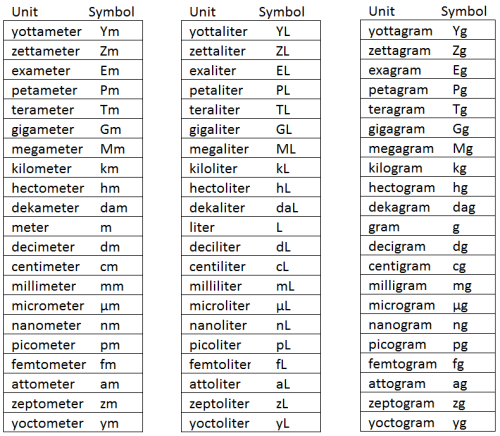Spelling Variations of International System Unit Names
Measurement harmony on Earth has obvious advantages. Governments all around the world have standardized units of measure in our era of globalization and international trade. The International System (SI) of units makes use of standardized symbols for length, volume, and mass. These symbols transcend language. In other words, these symbols are the same in every language.
It would be wonderful if every language could share a standardized spelling of international units, but not every language uses a Latin-based script. Chinese does not even use an alphabet. A meter is spelled metro in Italian, Spanish and Basque. A meter is spelled metar in Croatian and mita in Igbo. The spelling variation list goes on and on. So you see, employing unit symbols for product labeling transcends language differences.
The Human mind is keen on finding patterns in Nature, so it is no surprise that some people insist that the spelling of metre / meter and litre / liter be standardized in English. That’s not gonna happen. American English has evolved many variations across a wide ocean. We are lucky enough on the rare occasion that an American even uses the word meter. By the way, Americans and Brits spell many words differently. Here is a short list: theater / theatre — color / colour — flavor / flavour — center / centre — maneuver / manoeuvre. For heaven’s sake, we cannot even standardize / standardise the word standardize / standardise!
The primary SI unit is spelled meter in at least ten non-English languages. Those languages are:

The primary SI unit is spelled metre in only three non-English languages: Catalan, Turkish and French. So it can be argued that Earthlings tend to prefer the spelling meter over the metre.
Then there is the argument that the word meter already has a meaning, so we must spell metre the British way in order to avoid potential confusion. Well that argument falls short too. In this sentence — They were too close to the door to close it — the word close has two different meanings, yet it is spelled the same way. Languages are loaded with heteronyms, so the fact that the word meter can have different meanings is not a big deal. Do not desert me here in the desert! Do you know what a buck does to does? I did not object to the object. We must polish the Polish furniture. He thought it was time to present the present. OK. You don’t need more examples. You get the idea.
Please stop arguing about how meter / metre and liter / litre are spelled. This spelling issue serves only to distract us from our goal of measurement harmony on Earth.
